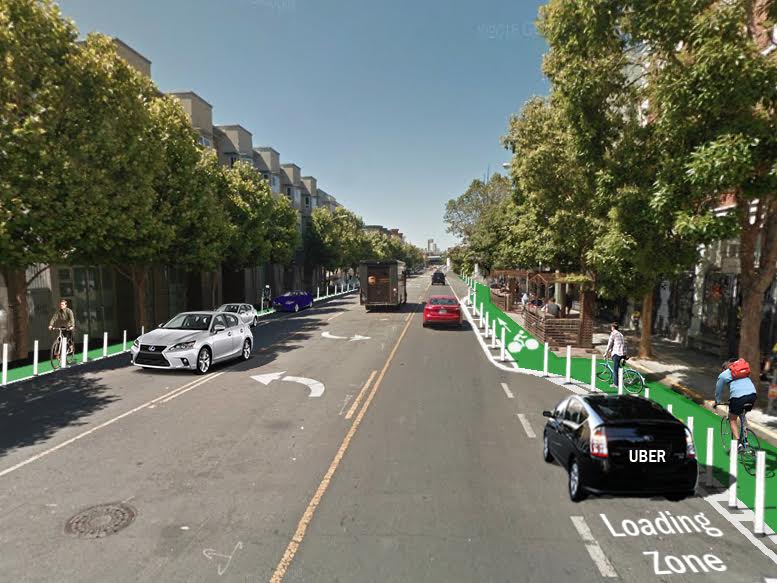Note: GJEL Accident Attorneys regularly sponsors coverage on Streetsblog San Francisco and Streetsblog California. Unless noted in the story, GJEL Accident Attorneys is not consulted for the content or editorial direction of the sponsored content.
Today the San Francisco County Transportation Authority approved $145,000 for the 'Valencia Street Bikeway Implementation Plan,' a study into putting protected bike lanes on Valencia. "It really is an urgent and acute situation. I’ve personally seen how dangerous it is," said Jeff Sheehy, the Supervisor who pushed for the plan (Valencia is on the border between his district and Hillary Ronen's). The money will come from Prop. K sales tax funds.
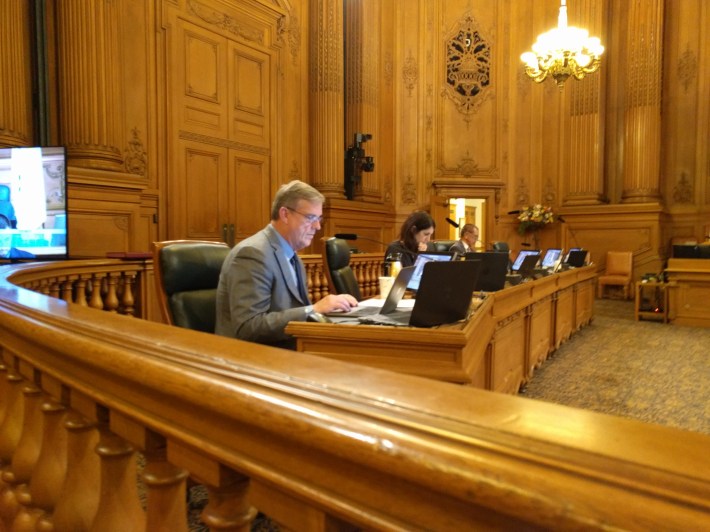
The study can be claimed as a victory for safe-streets advocates who have done everything short of stand in the middle of Valencia to protest the dangerous conditions (oh wait, they did that too, several times). "Bikers are not wearing armor; they are pedestrians on wheels," said Matt Brezina, who helped organize the people-protected bike lane protests on Valencia and elsewhere, in a public comment to the board.
The hope is to get physically protected bike lanes, isolated from car and truck traffic by planters, a curb, parked cars, or some combination.
Some ten speakers came to support the funding measure, which passed the board unanimously. Nobody spoke in opposition.
"The Valencia street bike lane is unusable at this moment due to double-parked cars. It’s Lyft and Uber, but it’s not just them," said Kyle Grochmal, an advocate who address the board. "What really makes me nervous and passionate is there’s so many families with children--this is a tragedy waiting to happen."
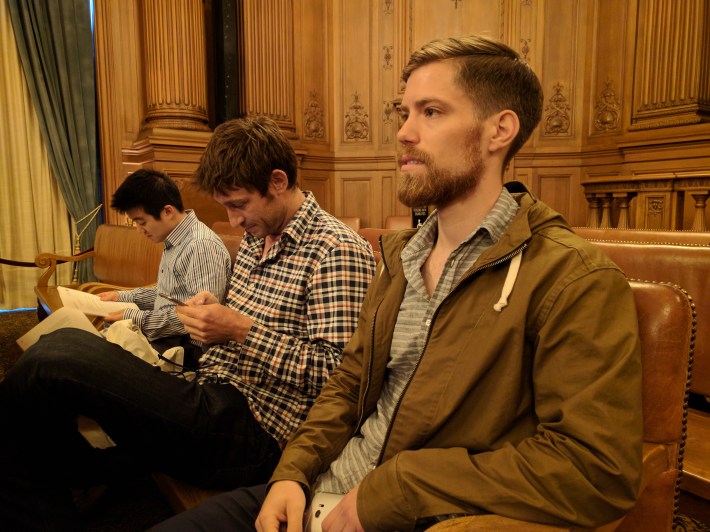
"A lot of people have been hurt on Valencia," said Paul Valdez, an activist who helps organize the annual 'Ride of Silence' in San Francisco to remember cyclists who've been killed. So far, nobody's been killed on Valencia, but that's just luck, he said. "I hope there isn't a day when we have to honor a life lost on Valencia."
That's why many of the activists, and the commissioners, wanted to make sure the SFMTA study they are funding is done as quickly as possible and that improvements are put in fast. "Waiting a whole year to start any of this, I’m not sure I understand the necessity of that," said Sheehy to SFMTA planning staff. The current schedule is to start the study in January and complete it in the fall of 2018.
"Absolutely, we want to work at near-term options," said Jamie Parks, the planner at SFMTA charged with the Valencia project. "We want a phased implementation structure as part of this plan."
Sheehy suggested starting at the southern end of Valencia, between Cesar Chavez and 19th. This makes sense, since there's already a short distance of protected bike lane to build off of just south of Cesar Chavez--and the big challenges on Valencia, the narrower sections of street/overhead trolley wire--are north of 19th. "Let's do every bit we can do," said Sheehy, who added that he wanted to see improvements, even if it's just plastic bollards in a few spots, phased in as quickly as possible.
Brezina agreed, and seemed to suggest borrowing from the SFMTrA playbook (as seen in the lead image) and putting in safe hit posts and paint immediately, at least next to parklets, since there's no need for a car to cross the existing bike lane to access the curb. The logic there is that the barrier around the parklet precludes curb access already. "There’s no reason a car needs to occupy that space--there’s room for a two foot buffer and safe hit posts. We can protect people today."
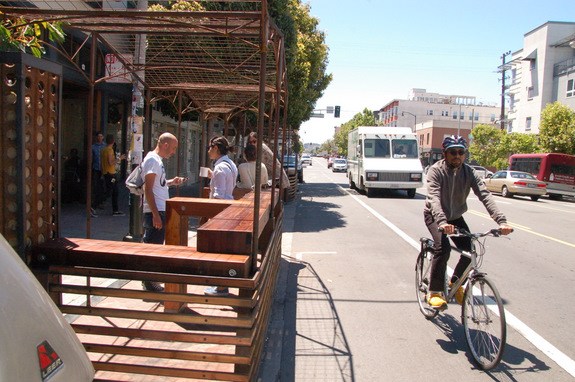
Ronen agreed that immediate action is needed. "I’m very fearful that someone is going to get severely injured or killed if we just wait to get those bike lanes installed, we need to act urgently now." She said she is appealing directly to Uber and Lyft to try and get them to "geo-fence" the street, so passengers are discharged on side streets, to stop the drivers from using Valencia's bike lanes as passenger drop off zones. "I wish as a local body that we had the ability to regulate these companies and force them to do what they should be doing to protect pedestrians and bicycles, unfortunately we don’t have that ability," she said.
However, several advocates took her to task for that comment, since San Francisco is, obviously, able to issue expensive tickets for double parking on or driving in a bike lane--its law enforcement officers simply don't do it with any kind of regularity. "Clearly enforcement of these double parking violations isn’t happening and something needs to be done," said Grochmal.
Ronen agreed and promised to work on it. "We need to make it known that if you double park on Valencia you’re going to get a ticket."
From Streetsblog's view, these are all positive developments. However, it was notable that nobody--no politician, no advocate, no staffer--mentioned protected intersections for Valencia. Protected bike lanes are necessary for a safe cycling environment, but not sufficient on their own. Most of the deaths and serious injuries in San Francisco happen at intersections--building protected bike lanes without protecting the intersections is only half a solution. Currently, San Francisco has only one protected intersection, at 9th and Division
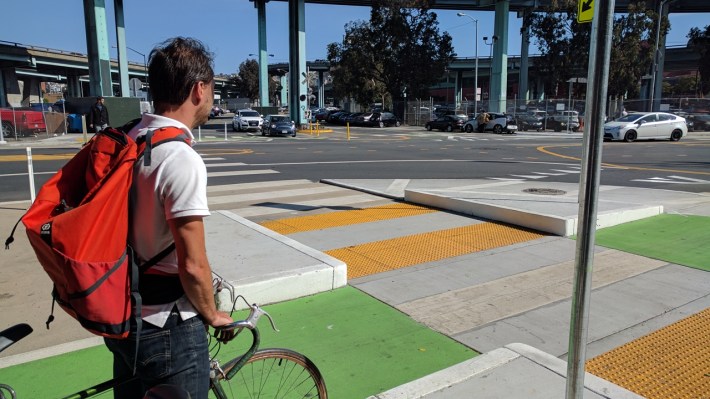
Unfortunately, recently installed protected bike lanes in the South of Market neighborhood still provide no protection at intersections. Streetsblog sincerely hopes that the city will correct this deficiency in its designs moving forward.
Parks, meanwhile, agreed to have an initial proposal for short-term improvements ready by March 1.
